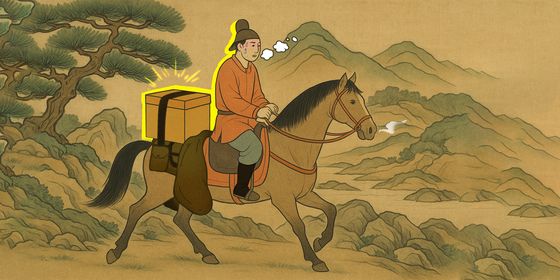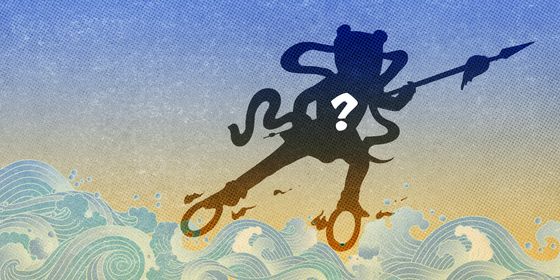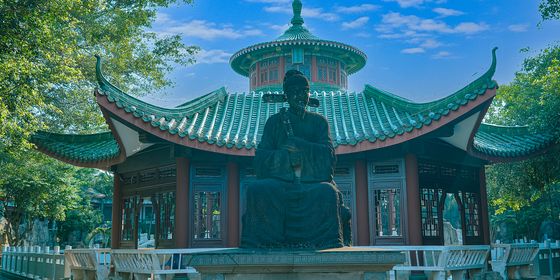A character that probes the unfamiliar and questions the unknown
When famous Three Kingdoms-era general Lü Meng (吕蒙) was just 15, he ran away from home and secretly joined the Wu state’s military campaign against mountain bandits. Returning afterwards, Lü pointed out to his furious mother that his life-threatening adventure had granted him fame and fortune, asking “不探虎穴,安得虎子? (Bù tàn hǔxué, ān dé hǔ zi? How can one catch tiger cubs without venturing into the tiger’s lair?)”—that is to say, “nothing ventured, nothing gained.”
From a personal adventure to a national expedition to outer space or the deep sea, 探 (tàn) is the word for the exploration of any unfamiliar or little-known field. In picto-phonetics, the left “hand” radical represents its meaning and the right originally gave the character its pronunciation, although this changed over time.
According to the Han dynasty (206 BCE – 220 CE) dictionary Explaining and Analyzing Characters (《说文解字》), 探 refers to extending one’s hand to reach for something. For example, “探囊取物 (tànnáng qǔwù)” means to take something from one’s pocket. The expression later became a proverb to indicate an easy task, since it takes no effort to reach into one’s own pocket.
Other things are better hidden, and may take more time and energy to find. For example, 探矿 (tànkuàng) means to prospect for minerals; 探案 (tàn'àn), to investigate and find out the truth in a criminal case; 探秘 (tànmì), to probe into secrets or explore unexplained phenomena; and 探险 (tànxiǎn), to venture into the unknown. In particular, the last two are commonly undertaken in remote and inaccessible locations, as in 深山探秘 (shēnshān tànmì, exploring remote mountains), or 南极探险 (Nánjí tànxiǎn, exploring the South Pole).
探 can also be paired with other verbs to describe different types of exploration. For example, 探索 (tànsuǒ) means to explore and seek, and is often used in scientific contexts, as in 人类不断地探索自然界的奥秘 (Rénlèi búduàn de tànsuǒ zìránjiè de àomì, Humans are continually exploring the secrets of nature). 探究 (tànjiù) means to probe deeply and reflect. For example: "这本书探究的是人生的意义 (Zhè běn shū tànjiù de shì rénshēng de yìyì, This book probes the meaning of life)." However, it’s usually important to look at multiple perspectives and solutions in an exploration; therefore, 探讨 (tàntǎo) means to examine and discuss a topic. For example: "最近经济学家在对经济体制改革做进一步的探讨 (Zuìjìn jīngjìxuéjiā zài duì jīngjì tǐzhì gǎigé zuò jìn yí bù de tàntǎo, Recently, economists are further examining the question of structural reform)."
Apart from reaching with one’s hand, 探 also implies putting the rest of one’s body forward. Common usages include 探头 (tàntóu, pop one’s head in), as well as 探头探脑 (tàntóu tànnǎo, pop one’s head in and look about furtively); the latter is often used pejoratively to mean “snooping.” For example: "小偷儿进了大楼后探头探脑地四处张望 (Xiǎotōur jìn le dàlóu hòu tàntóu tànnǎo de sìchù zhāngwàng, The thief looked around furtively after breaking into the building)."
In this sense, some 探 expressions can be extended to mean visit, call on, or see. 探望 (tànwàng) is to visit someone from afar. For example: "路过北京,顺道探望一下老朋友 (Lùguò Běijīng, shùndào tànwàng yí xià lǎopéngyǒu, While traveling through Beijing, I dropped by to visit an old friend)." Similarly, 探病 (tànbìng) means to visit patients at the hospital or in their homes; 探亲 (tànqīn) is to visit one’s parents or relatives; and 探监 (tànjiān) is to visit inmates in prison.
Not all explorations are carried out in the open: 探听 (tàntīng, inquire about) usually means to find out information covertly, as in "已经有好几个人来探听新所长任命的消息了 (Yǐjīng yǒu hǎo jǐgè rén lái tàntīng xīn suǒzhǎng rènmìng de xiāoxī le, Several people have nosed around for news about the appointment of a new director)." The verb 刺探 (cìtàn, spy on) particularly refers to scoping out a rival, or opposition research. For example, "敌军在刺探我方军事设施 (Díjūn zài cìtàn wǒfāng jūnshì shèshī, The enemy is spying on our military installation)." The character can also be used in nouns referring to the person sent out to collect the information, such as 侦探 (zhēntàn, detective), 探子 (tànzi, scout), or 密探 (mìtàn, spy).
Throughout history, human beings have continually explored the outer limits and unknown spheres of nature and society, from the medical tests of Shennong (神农, a legendary prehistoric ruler of China, sometimes known as the father of Chinese medicine and agriculture), to the modern search for the “wild man” of Shennongjia Forest. As long as human beings have curiosity, ambition, and a need to survive in the universe, the urge for exploration will doubtlessly persist.
On the Character: 探 is a story from our issue, “Curiosities and Quests.” To read the entire issue, become a subscriber and receive the full magazine.












